|
|
TODAY.AZ / Politics
President Ilham Aliyev attends XI Global Baku Forum
14 March 2024 [10:20] - TODAY.AZ
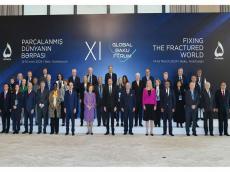
Organized by the Nizami Ganjavi International Center under the patronage of President of the Republic of Azerbaijan Ilham Aliyev, the 11th Global Baku Forum themed “Fixing the Fractured World” has started at the Gulustan Palace in Baku, Azernews reports.
President Ilham Aliyev attended the opening ceremony of the Forum.
First, a family photo was taken.
Opening the 11th Global Baku Forum, Ismail Serageldin, the co-chair of the Nizami Ganjavi International Center, said:
- Your Excellency, President Aliyev.
Ladies and gentlemen.
I am Ismail Serageldin, co-chair of the Nizami Ganjavi International Center, and it is my great privilege to welcome you all to the 11th Global Baku forum.
We meet under the title of Fixing the Fractured World. The world is indeed fractured. Severe challenges are everywhere. Indeed we meet in a time of peril, but we also meet in a time of promise. Peril is abound. The big powers are rending the fabric of the established order, as a New World Order struggles to emerge. And in the process, they undermine the existing peace and security arrangements of multilateral rules-based approaches. Insurgent Russia, wages a destructive war in Ukraine, ignoring the UN General Assembly votes against it. In the case of the war in Gazza, triggered by the terrible October 7 attack by Hamas, the world is ardently demanding a humanitarian ceasefire but the US is supporting the Netanyahu government and refusing a ceasefire.
Conflicts beset many parts of Africa. Haiti falls into a spiral of chaotic violence and criminal violence is the bane of many Latin American countries. Wars rage in many parts of the world. Nations are as multi-layered as ever with ethnic, religious and political divides that challenge the stable national governance and that views negatively any type of immigration, even as the number of refugees and displaced people now exceeds 100 million persons. The American Colossus casts a giant shadow, as its deeply divided politics undermine confidence in any consistent engagement in this world of shifting tectonic plates, where lines of cleavage are being constantly redrawn. Meanwhile, arising China justifiably seeks to have a major say in the emerging new world order.
Perils abound, as the world is failing to remain on its adopted sustainable development path. The global challenges confront humanity. From climate change and biodiversity loss to the mismanagement of precious water resources, inequality, extreme poverty and hunger afflict over 1 in 10 of the human family. We are barely coming out of a raging pandemic without having learned the lessons of how to prepare for the next one. Global challenges require a global response. But we also stand on the cusp of an unbelievable revolution in science and technology and innovation. Artificial Intelligence is now affecting everything and accelerating the pace of innovation in all fields, and assist in solving all sorts of complex problems. The Revolution of ICT is matched by another revolution in the new biology, rejuvenated process of science technology and innovation. STI is poised to help us redeem the promise of science, namely, that it can heal the sick, feed the hungry, refashion our development to be in harmony with nature, bring dignity to work and create the scope for self-expression. Provided that we do not just focus on the destructive and lethal applications of these new technologies.
Excellencies, ladies and gentlemen, the Global Baku Forum is a unique space of freedom, where eminent people with exceptional experience and insight, holding a broad range of opinions can discuss their views on all these issues, to reduce the perils and enhance the promises. Discuss all this and more with a commitment to civility in discourse and rationality and argument. And beyond their knowledge and experience they also bring to bear their wisdom. We hope that the results of these discussions may help us develop insights that will enrich the discussions at the upcoming United Nations summit for the future and the COP-29 meetings, which will be hosted by President Aliyev here in Azerbaijan.
And to start us on this Global Baku forum. It is my honor and my privilege to call upon our patron, our host, His Excellency President Ilham Aliyev. Your Excellency.
x x x
The head of state addressed the opening ceremony.
Speech by President Ilham Aliyev
- Dear ladies and gentlemen, dear guests.
Welcome to Azerbaijan. I am glad to see all of you here today at the annual Forum, which transformed many years ago into one of the leading international conferences on a global scale. I think that Global Baku Forum now stands in line with other leading international fora like the Davos World Economic Forum and the Munich Security Conference. With respect to the potential of Nizami Ganjavi International Center and the list of participants, we really see that the discussions held annually here in Baku contribute to a better understanding or different important international issues.
The world is changing rapidly. Unfortunately, new areas of instability and confrontation are emerging. If we compare what we discussed last March to what we are discussing today, we see substantial changes, including geopolitical changes. Therefore, the experience of members of NGIC and participants, their knowledge, and their experience as heads of state and government, and foreign ministers really are something which the world needs today in order to address issues of global importance.
This time, we have, I think, a record number of participants, more than 400 guests attending 11th Forum from 68 countries. So, we also have expanded the geography among our guests, we have more than 40 acting and former heads of state and government. So, this really is an illustration of a huge intellectual potential of the Forum.
Yesterday, I met with the members of Board of NGIC. We had very good and sincere discussions about many issues. Our meetings prior to the Forum already had a good record of establishing a positive tradition. Yesterday, I once again expressed gratitude to the members of Board for their activity. Because throughout the year, the NGIC has been doing a great job in bringing the most important and urgent issues of the global agenda to the attention of decision-makers in different parts of the world.
Once again, I'd like to express my personal gratitude to the co-chairs of NGIC, Madame Vike-Freiberga and Mr. Serageldin, for their continuous contribution to the NGIC and for their excellent performance as co-chairs. They really managed to create a strong team of very special personalities and to organize the work of the center as a really result-oriented international NGO, which today is well-respected on a global scale.
As I said, since we met last time, many things have happened in the world and also in our region. Changes in our region may seem to have a local character, but actually, I think that they have much broader implications. Because the main geopolitical change, which happened since we met last time here a year ago is the full restoration of territorial integrity and sovereignty of Azerbaijan. And this is a really very serious geopolitical change, which I think will have a lot of positive consequences with respect to resolution of conflicts, which seem to be unresolvable.
For many years, we've been working in order to find peaceful solution to the conflict. For many years, including our annual meetings here prior to the Second Karabakh War, we were always talking about injustice, occupation, violation of international law, and the non-implementation of UN Security Council resolutions, and we continued to talk about that because we wanted this issue to be in the center of attention of the international community. We wanted justice to prevail, but unfortunately, it didn't happen by peaceful means.
For 28 years of the activity of the former Minsk Group, the result was zero. And now, after 28 years, when we analyze and look back, how it continued, we are absolutely sure that the main objective of the Minsk Group was not to resolve the conflict but to freeze it, to make Armenian occupation eternal and to try to communicate with us inevitability of our agreement with the occupation.
This is a main reason why the conflict was not resolved by peaceful means, along with of course, the unconstructive position of Armenian governments, different governments starting from the beginning of the 1990s until today. There was another message, which regularly was channeled to us from the world's leading capitals that there is no military solution to the conflict. We said yes, okay. We may agree with that. But what is the alternative? If the alternative is to agree with occupation and agree with the existence of the separatist regime on almost 20% of our internationally recognized territory, that's not something we can agree with.
We can agree that there can be no military solution in one case: if you, the Minsk Group co-chairs, the leading countries of the world, the permanent members of the United Nations Security Council, will force the occupational forces of Armenia to withdraw from our lands. You, who yourself adopted four United Nations Security Council resolutions, which demanded the immediate and unconditional withdrawal of Armenian troops from Azerbaijani territories, should provide the implementation of these resolutions, otherwise, the conflict will never be resolved.
Unfortunately, all our attempts to find a peaceful solution to the conflict have failed, and the reason I have already explained. So, the resolution of the conflict by military-political means actually demonstrates that, in order to achieve peace, sometimes you have to use military option, and that is what is happening now. Now we're closer to peace with Armenia than ever before. Never in the history of the independence of the Southern Caucasus has peace been as close as it is today. This is a result of the Second Karabakh War. This is a result of the anti-terror operation we held last September, which lasted less than 24 hours and put an end to separatism forever in Azerbaijan, restoring our sovereignty and territorial integrity.
That's why when I say that what has happened here in Azerbaijan during the last three to four years is not the issue of local character. It has a lot of already positive implications on the situation, not only in the Southern Caucasus. I think it can be used as a pattern to resolve conflicts, which seem to be unresolvable. But first of all, of course, with the prevalence of international law. International law norms were on our side, Azerbaijan was the subject of illegal occupation and ethnic cleansing and genocide. All these are well-known historical facts. We restored justice and international law ourselves. No one helped us, we did it ourselves.
We demonstrated strong political will, and also our potential. Because strong political will without strong military capability and unity of the people will not lead to success. So, a combination of all factors, our economic development, our financial capability, our defense capability, training of our military personnel, active and pro-active foreign policy, when all the leading international organizations like the United Nations, OSCE, Non-Aligned Movement, Organization of Islamic Cooperation, and others fully supported Azerbaijan's position on the issue of territorial integrity.
Was it possible to avoid a military solution? Yes. Yesterday we discussed broadly with the members of the Board and I a little bit opened the curtain of insights. There was a chance to reach an agreement in 2018 when there was a change of government in Armenia. We got assurances from the new Armenian government that they will behave in line with the international law and territories will be returned. We had those expectations, and if, at that time, the Armenian new government had preferred to behave as they do now, then there would have been no need to restore our sovereignty by force.
But unfortunately, in 2019, the new Armenian leadership put forward absolutely unacceptable proposals, such as “Azerbaijan have to negotiate with separatists, all what has been elaborated as a basis for a peace agreement should have been wiped out, and everything should have started from scratch, and Armenia is not going to return one centimeter of occupied territories”. Moreover, the famous slogan articulated by Armenian Prime Minister that “Karabakh is Armenia”. First, it's an absolute violation of international law, and second, it was too ambitious for a country that thought that they could keep our lands forever.
So, we had to teach them a lesson in 2020, in September-November, and we thought that this lesson was enough for them to understand that the time when they could rely on foreign forces and keep the lands of another country under occupation had gone.
Was there an opportunity to achieve peace during the last three to four years? Yes. Only if Armenia had behaved constructively with respect to our proposal of a draft peace agreement, and had not insisted on incorporation into this peace agreement the so-called Nagorno-Karabakh Republic status. First, this kind of republic do not exist. It exists only in their dreams and in their mythology. Second, our opposition was again totally in line with international law. In interstate agreements, issues of internal politics should not be present.
Based on the capitulation act, which Armenia had to sign on 10 November, 2020, they were obliged to withdraw their occupational forces from the remaining part of Karabakh, which at that time was not under our control. But for three years, they didn't do it. Not only did they not withdraw almost 15,000 of their military contingent, but they also smuggled weapons, mines, ammunition to Karabakh, taking advantage of the situation when we did not control communication in the aftermath of the Second Karabakh War. After we started to control the communication, of course, this smuggling stopped. Nevertheless, during the last anti-terror operation, military ammunition including heavy weapons and armored vehicles, with a cost and worth close to 1 billion US dollars, was destroyed and taken as trophies. During the Second Karabakh War, military trophies and what was eliminated during the war had a cost was close to 5 billion US dollar. The question is: “Where did Armenia get all that money?” Of course, it's clear that all the weapons they were using against us were given to them free of charge.
Now, when Karabakh issue is closed, we are very close to peace. That's what we think. Azerbaijan is ready to continue the peace process. Meetings at the level of the foreign ministers of both countries have now resumed, and we think that peace is reachable. That is what we want. We restored historical justice and international law, and now it's time to put an end to hostility in the region.
One issue to which I also want to draw your attention is the international reaction to our anti-terror operation, which was absolutely adequate in the majority of cases. The international community, different countries and international organizations in public statements, and also in our behind-the-scenes communication, expressed full understanding of what we have done and what we had to do. The understanding that there were two red lines which Armenia crossed prior to our anti-terror operation, and in general, the reaction of the international community was absolutely positive.
To inform you about some details, I just want to say what happened at the beginning of September, and why did the anti-terror operation happen in September? Because at the beginning of September, the Armenian Prime Minister sent a congratulatory letter to the separatist regime in Karabakh, congratulating them on the so-called independence. That was a big surprise and a bad surprise for us. Because the same Prime Minister of Armenia publicly recognized Azerbaijan's territorial integrity in 2022 at the meeting in Prague and reiterated several times that Armenia has no territorial claims to Azerbaijan.
Then, what was that congratulations about? That was a congratulation to separatists, and that was a violation of Azerbaijan's sovereignty, and an absolutely unacceptable and contradictory gesture. And then, on the 9th of September, the so-called Nagorno-Karabakh Republic, which again exists only in the dreams of some people, held the so-called presidential elections, and that was another red line.
So, these were actually the final triggers that led to the anti-terror operation, which lasted several hours, and after 23 hours, separatists surrendered. There were no casualties among civilians, and as soon as separatists surrendered, we stopped the operation, and that was actually the end of the story.
Talking about international reaction, unfortunately, I have to mention the position of one country, which is absolutely in contradiction with the international community. This is France. I regret it very much because relations between Azerbaijan and France since the beginning of the 1990s developed in a positive direction. There have been numerous high-level visits, a lot of business contacts, 13 cities from each country had an agreement, and they were named sister cities.
But the reaction of the French government to the Second Karabakh War and the anti-terror operation was absolutely inadequate. There were five attempts to bring this issue to the Security Council of the United Nations and to impose sanctions on Azerbaijan - for what we have not done. We did not do anything in contradiction with international law. All these five attempts failed because other members of the Security Council did not support that. After that, there were several attempts to sanction Azerbaijan in the European Union. And those attempts also failed. The majority of countries of the European Union did not support that.
Unfortunately, what happened after that is absolutely beyond normal understanding. There was an act of vandalism in France, in the city of Evian, which used to be a sister city to one of the cities of Azerbaijan. The monument of Azerbaijani poetess Natavan was vandalized. I just want to show you the monument - the red color and the broken nose. This happened in France, as a result of the failure to sanction Azerbaijan in the Security Council and the EU.
And after that, what happened? The authorities did not try even to wash out the color or to restore the monument, and what have they done? They've just wrapped it, and in this wrapped position, it stayed for more than one or two months. And all our requests to the French authorities through our embassy and other channels and to the Mayor's Office of Evian just to stop continuing the vandalism because wrapping it like this and keeping it in there without even an attempt to clean this red color is vandalism in itself. There was no reaction, neither from the French government nor from Evian.
Then, we started to insist that allow us evacuate it. Because this is an insult to us. This is a humiliation. In a country like France, which pretends to be a moral leader, in many cases, things like that are unacceptable. But it took us again several months to be able to evacuate it from Evian and bring it to the garden of the Azerbaijani Cultural Center in Paris, where Natavan is now staying.
This is just an illustration of what we're facing after we restored our sovereignty. This is an illustration of double standards. France, which declared that they will send troops to Ukraine to help Ukraine restore its territorial integrity, tries to punish Azerbaijan for our restoration of territorial integrity.
Another topic that I want to bring to your attention and that we discussed broadly yesterday is COP29. We count very much on the NGIC to be an active partner of Azerbaijan in preparation and during the conference. COP29 in Azerbaijan is a recognition of Azerbaijan's efforts with respect to the green transition. As I have said many times, including in public comments, the fact that we have oil and gas is not our fault, and we should not be criticized for that. I think those who try to criticize us and those who made the decision to award us with this honor to host this global event should understand that our intention is to contribute to the issue of climate. All that we are doing with respect to the green transition already has practical results.
Last October, we inaugurated the biggest 230 MW solar power plant in the area of the Caucasus and Central Asia. Two more are now in the process of construction and preparation. Our plans until 2030 are to have a generating potential of 5,000 megawatts of renewables. This is absolutely realistic because many contracts and MOUs have been signed.
We are actively working now on building the green energy cable from the Caspian to the Black Sea and further down to Europe, and the feasibility study of that project is almost ready.
So, first, COP29 will be for us the chance to demonstrate that the country, which lives independently and does not depend on anyone, can successfully develop. It is a demonstration of the right policy that Azerbaijan has pursued for the last 30 years. From a practical point of view, it will be a chance for us to contribute to solidarity. Because four years of our chairmanship in the Non-Aligned Movement created a very special atmosphere in this second largest international institution after the UN, with 120 countries. With nine members of the EU, Azerbaijan signed declarations on strategic partnership. We are members of the Organization of Islamic Cooperation with more than 50 members. So, we have the capability to bring together different countries, and that is what is needed now to address the issues of climate.
I don't want to take much of your time, I know that you have a very busy program. I will conclude now. Once again, expressing gratitude to all our participants for being with us, especially to the NGIC, and wishing the Forum success.
x x x
Addressing the event, Vaira Vike-Freiberga, the Former President of Latvia and the co-chair of the Nizami Ganjavi International Center, said:
- Your Excellency President of the Republic of Azerbaijan Ilham Aliyev.
Your Excellencies presidents, former presidents, heads of government – both former and current.
Ladies and gentlemen.
Dear guests and friends, friends of the Nizami Ganjavi International Center.
I would like to start my speech by thanking President Ilham Aliyev. We have been welcomed with very warm hospitality. Over the past 11 years, we have been gathering in Baku to participate in the Global Forum. We have always witnessed full cooperation and your openness in accepting the increasing number of participants of this forum.
We see that people are suffering in different parts of the world today. This is why we have always gathered in one place to exchange ideas on common issues of concern, to revive and restore the broken world. Together, we can narrow this divide and alleviate people’s suffering.
Since last year's Baku Forum, we have been hearing a lot of bad news, watching it on news channels and social media. But there has also been good news. The good news is that – President Aliyev also noted that – Azerbaijan is one of a handful of countries of the world where a 28-year-old frozen conflict has finally been resolved. Armenia illegally occupied the territory of its neighbor in violation of international law, but your country has restored its territorial integrity, i.e. its own territorial integrity. But despite this, 50 conflicts are still fuming in the world. Ukraine is faced with the occupation and annexation of its territory. This reminds us again that a state that succeeded the Soviet Union, a country that was based on Stalin's principles and occupied Baltic states – Estonia, Latvia and Lithuania – in World War Two, is doing the same now. At that time, they turned those states into parts of the Soviet Union, and it happened in a special way. What is happening in Ukraine today is exactly a repetition of those historical facts. So there is actually a comical situation on the one hand and a tragic one on the other.
The President made a reference here. When it comes to our broken world, we can make it better. We can actually see the severity of the lines that divide us. We can see that there can be different opinions, behaviors and interests. But it is possible to come together and find common solutions. Of course, there should be at least good will for this and we have to make it work. The lack of good will and trust leads to very serious consequences, as we see all over the world today.
We are living in a world where there are certain principles. Based on the good will of people, we try to resolve issues related to living together. Since its inception, the UN has established those principles through its Charter and the Universal Declaration of Human Rights, and noted that peoples of the world must adhere to those principles. Under such circumstances, we can live in a civilized world and have good relations with our neighbors. Of course, when any such behavior occurs today, we simply liken it to the behavior of predatory animals. Because we must remember again that some breeds base their existence on certain natural instincts. In Soviet times, we had farms in Latvia, where a number of dairy products were produced. Those dairy products were of high quality and popular. However, we were deprived of the opportunity to use them. I should also mention that there is an island in our country, and a great blow was inflicted on nature on that island. Many birds were killed there. It was a step against nature. Because this island actually became a victim of the political goals of the predators. In fact, it is the same among people. There is a feature inherent in human nature that some people try to impose their will on others and use force to achieve that. But we see that this is completely unacceptable.
I should also note that the principles declared by international organizations should remain in force. We should all know, remember and even mention it in our discussions that we don't have to reinvent the wheel. We should respect human beings – women, men and representatives of different races without discrimination regardless of their origin, creed or belief. This is what the rights of people and individuals consist of. We must build a world where there is no discrimination.
We must not forget that small countries also have rights. You may not have heard of them, you may not know about them, but they exist nonetheless. Many countries of the world are represented in the UN General Assembly. However, we must note that regardless of whether they are big or small, everyone has equal rights and this must be ensured.
Ladies and gentlemen, you come from different parts of the world and you have had different experiences. I urge you to join the debates, speak honestly, speak up and, of course, have discussions without harming each other. Because we are a civilized society. We have come here to get to know each other, to listen to each other, and this is our advantage as human beings. Of course, we should also pay attention to each other, meet and understand each other.
I wish you all a fruitful discussion. We will have meetings during these days, and you will actually contribute to our discussions. What is happening in the world today is exactly what is related to the human essence, i.e. it stems from it. Therefore, we must understand this well. I wish you fruitful discussions and an interesting forum.
x x x
Binali Y?ld?r?m, the Chairman of Council of Elders of the Organization of Turkic States, presented a keepsake to President of the Republic of Azerbaijan Ilham Aliyev.
x x x
Other speakers at the event included President of Albania Bajram Begaj, Serb Member of the Presidency of Bosnia and Herzegovina Željka Cvijanovi?, Director-General of the World Health Organization Tedros Adhanom Ghebreyesus, Under-Secretary-General for Policy at the United Nations Guy Ryder, Executive Director of the Joint United Nations Programme on HIV/AIDS (UNAIDS) Winnie Byanyima, and High Representative for the United Nations Alliance of Civilizations Miguel Ángel Moratinos.
x x x
Addressing the event, Binali Y?ld?r?m, the Chairman of Council of Elders of the Organization of Turkic States, said:
- I am very pleased and honoured to address you on behalf of His Excellency Mr. Recep Tayyip Erdo?an, President of Türkiye, on the occasion of the eleventh Global Baku Forum, which is successfully held every year. First of all, I would like to congratulate the organizers of the Global Baku Forum and the Azerbaijani authorities for organizing yet another very successful event this year. We are pleased to observe that the Global Baku Forum, which has been held for many years and has already become a tradition, is growing into an important ideation platform in its field.
It is also a nice coincidence for us that shortly after the 3rd Antalya Diplomacy Forum, which we have hosted in Türkiye on March 1-3, the "Global Baku Forum" is being held this time in our brotherly country Azerbaijan. As stated in the main theme of this year's Forum, "Fixing the Fractured World" is the most fundamental task before us, as the entire international community, in these challenging times which we are going through. As a matter of fact, the ever-increasing global and regional challenges and the disorganized and disorderly appearance of the international system, which is unable to respond adequately to these challenges, lead to a fragmented image all over the world. This fragmentation starts at the regional level and moves to the global level as a tangle of problems. When we look around us, we see that the regional disputes, tensions and hot conflicts do continue, and that these conflicts exert negative repercussions, not only on the political and military fields, but also on fields such as economy, transportation and energy, as well as in social and societal dimensions.
When we look at the South Caucasus, all countries in the region need to make constructive and result-oriented efforts to attain peace, security and prosperity that the region deserves.
Climate change, which is another challenge of modern times, is also an issue that concerns not only certain countries, but the whole world, and requires an all-out struggle. As you know, we will be addressing this issue extensively at the UN Climate Conference (COP29) to be held in Azerbaijan in November this year.
At this stage, Türkiye is endeavouring to lead towards the solution of the problems in its region together with friendly and brotherly countries, with the principle of "regional ownership". We believe that the "3+3 Regional Cooperation Platform" initiative, which was announced by President Erdo?an together with President Aliyev, during his visit to Baku on December 10, 2020, has an important function of strengthening this understanding of regional ownership on the path towards a comprehensive normalization and the establishment of peace and stability in the South Caucasus. This year, we will host the third meeting of this initiative in Türkiye. Another way of addressing regional challenges is to strengthen regional organizations. The Organization of Turkic States (OTS) stands among the leading organizations in this field with its cultural and historical unity, the spirit of solidarity at its core, and its targeted vision of a world in peace and stability. In essence, the common good of the Turkic World aligns with the initiatives for global peace, justice and stability. In this respect, the OTS has the potential to contribute to the prosperity and stability of not only the Turkic World but also our common geography and beyond. We believe in the benefit of increasing our contacts and cooperation under the roof of the OTS. In this context, I would like to draw attention to the fact that this year, the Informal Summit of the OTS will be hosted by Azerbaijan in Shusha in July, which has always held a special place for the Turkic World. In the coming period, the culture of cooperation within the OTS will continue to promote peace and stability in our region.
x x x
Fergus Auld, Ambassador of the United Kingdom to Azerbaijan, read out British PM Rishi Sunak’s letter to the Forum participants.
x x x
The Nizami Ganjavi International Center (NGIC) has become a leading international platform for addressing global challenges and raising awareness within the global community. As a result, interest in the events organized by the Center is increasing year by year.
The 11th Global Baku Forum, themed “Fixing the Fractured World", welcomed 350 guests from more than 70 countries.
The Forum, running until March 16, will feature global discussions on the outcomes of COP28 and preparations for COP29. It will also hold discussions on factors threatening the new world order, including security issues, prospects for ensuring peace, and building stability in a divided world. Additionally, the forum will address world-shaking conflicts and mega threats, including challenges related to climate, food, and nuclear security. Simultaneously, the forum will focus on the role of military and economic alliances in global governance, regional perspectives, relations with the European Union and its neighbors, youth policy, ways to increase resilience to global challenges, inequality, scarcity of natural resources, migration, as well as artificial intelligence, drones, and cyber weapons.
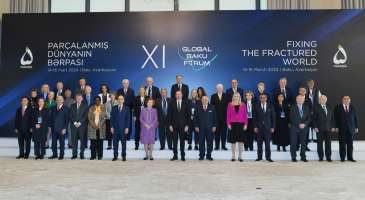
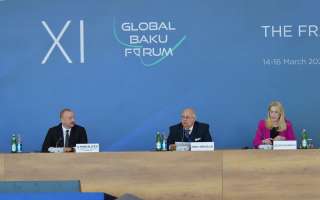
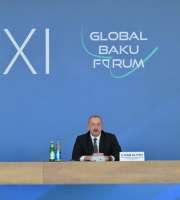
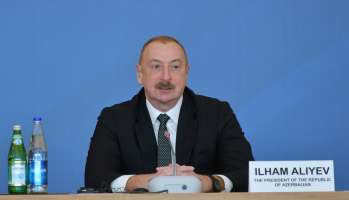
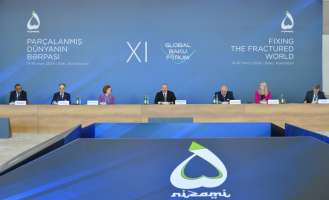
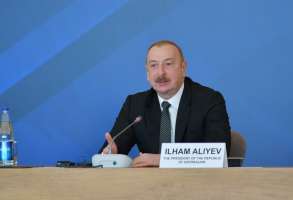
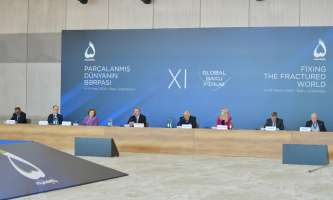
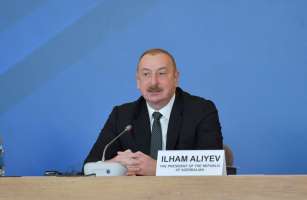
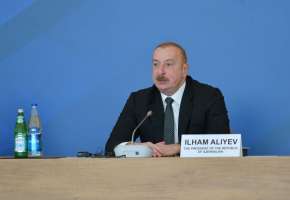
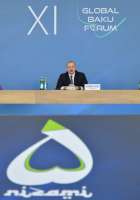
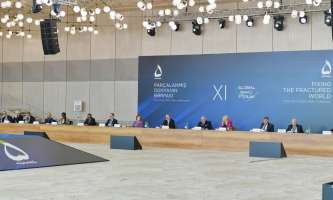
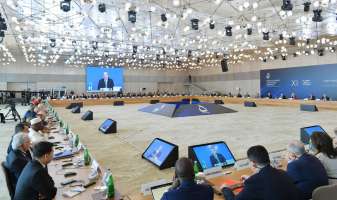
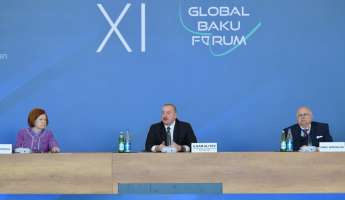
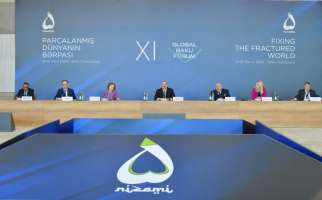
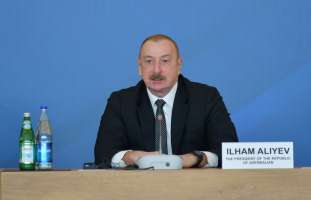
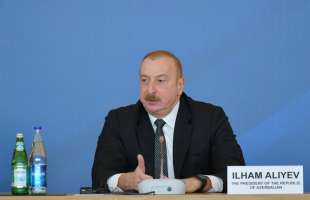
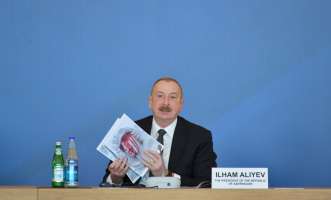
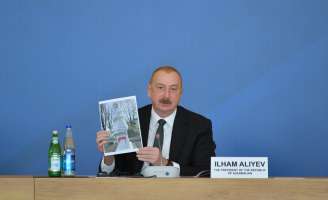
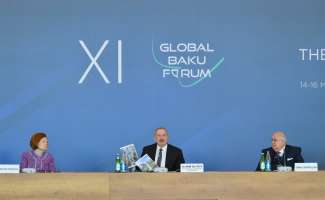
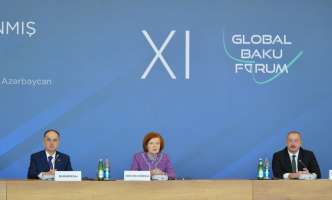
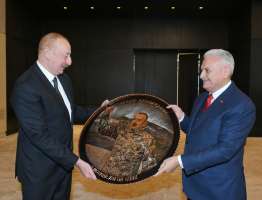
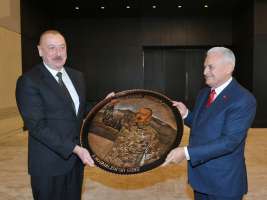
URL: http://www.today.az/news/politics/245965.html
 Print version
Print version
Connect with us. Get latest news and updates.
See Also
- 23 December 2024 [15:19]
Justice Ministry and BSU to collaborate on probationer rehabilitation and support - 23 December 2024 [13:27]
Common map of the Turkic world is being created - 23 December 2024 [12:21]
President: Azerbaijan is one of the unique destinations where different civilizations converge - 23 December 2024 [12:16]
President Ilham Aliyev sends congratulatory letter to Pope Francis - 23 December 2024 [12:12]
Azerbaijan’s strength lies in preserving multiculturalism and national values, says chairman - 23 December 2024 [12:05]
President Ilham Aliyev: Our country free from discrimination or conflict on religious grounds - 23 December 2024 [11:11]
Gloveman: Macron and his one-time premieres - 23 December 2024 [11:00]
Pashinyan plants a pig for the Armenians - 23 December 2024 [10:22]
Azerbaijani Foreign Minister visits Serbia - 23 December 2024 [10:00]
Shusha welcomes returning IDPs
Most Popular
 IDPs return to rebuilt Shusha as part of Great Return State Program
IDPs return to rebuilt Shusha as part of Great Return State Program
 Pashinyan plants a pig for the Armenians
Pashinyan plants a pig for the Armenians
 Azerbaijan, Russia inks agreement on Development of Transit Freight Transportation
Azerbaijan, Russia inks agreement on Development of Transit Freight Transportation
 Sweden's Climate and Environment Minister calls for Shein and Temu to be banned in country
Sweden's Climate and Environment Minister calls for Shein and Temu to be banned in country
 President Ilham Aliyev's remarks in his interview with Dmitry Kiselev in spotlight of world media
President Ilham Aliyev's remarks in his interview with Dmitry Kiselev in spotlight of world media
 S. Korea to launch 3rd homegrown military spy satellite
S. Korea to launch 3rd homegrown military spy satellite
 U.S. finalizes US$4.7 bln in CHIPS Act subsidy to Samsung Electronics
U.S. finalizes US$4.7 bln in CHIPS Act subsidy to Samsung Electronics
